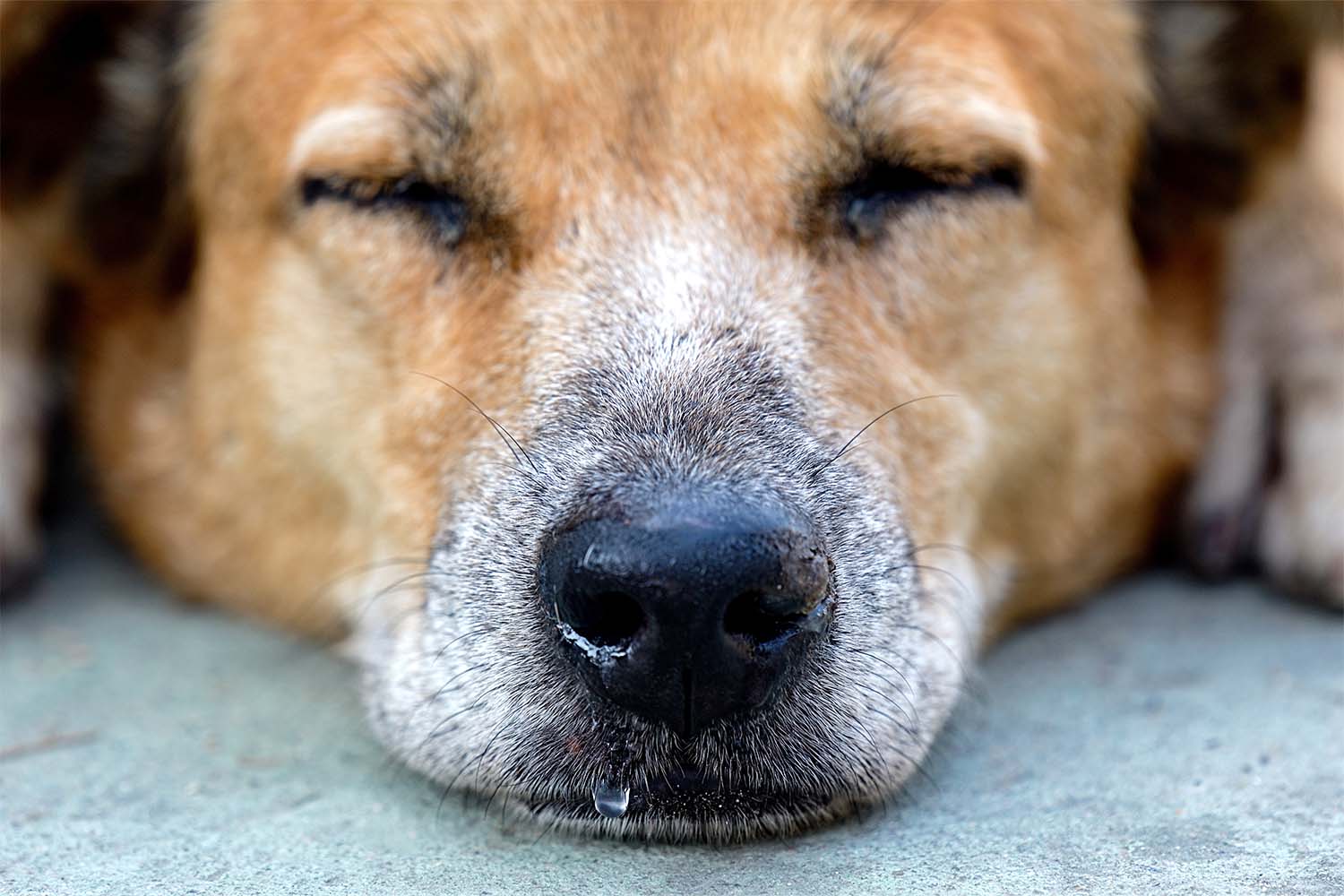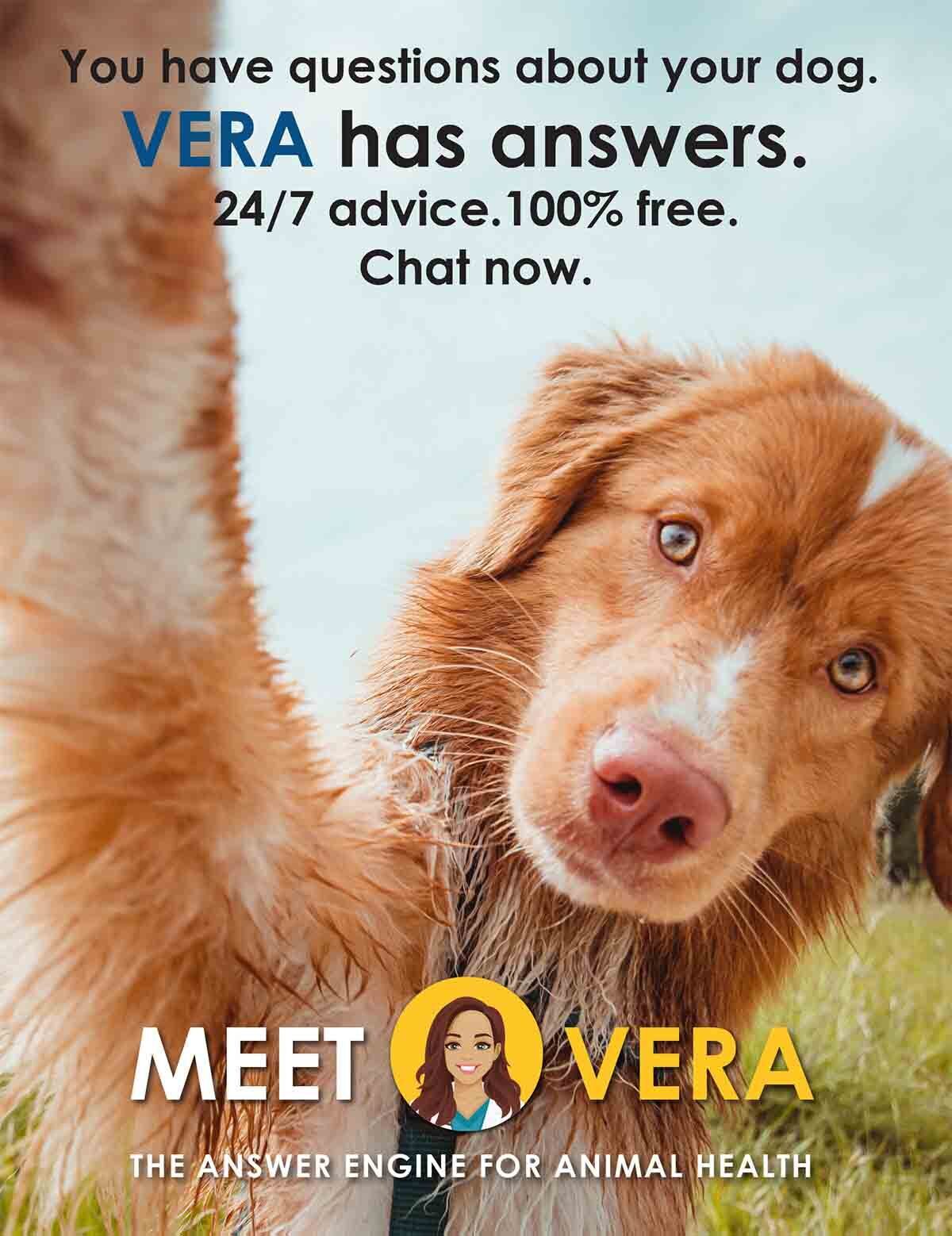It can be nerve-wracking when there is the slightest change in your dog’s behavior, whether it be their attitude, activity levels, or health. Getting to the bottom of it can be searching online for hours to figure out what might be going on with your pet. We understand just how difficult it can be to get to the bottom of your pet’s health — they can’t tell you what’s going on, and you can’t read their mind!
With certain symptoms, like a runny nose, there are many potential reasons why they might be experiencing a change in health. From something more common like allergies to something more serious like cancer, a runny nose can mean several things. Instead of jumping to the worst-case scenario, keep reading to learn more about how different issues can cause a runny nose.
At AskVet, our goal is to help you get to the bottom of things so you can spend less time worrying and more time loving your pet.
Is My Dog’s Nose Running?
Did your dog’s nose just drip on you, or are they just salivating due to the snack in your hand? Did they just dunk their face in the water bowl and bring you their leftovers, or is their nose actually dripping?
It’s not too difficult to rule out some of the above just by watching your dog for a bit. If you notice that their nose is running and a bit more wet than usual, it could be that they are experiencing a wide range of issues. Before panicking, it’s best to confirm that it is their nose and take note of any other symptoms that could be accompanying their runny nose.
What Are the Symptoms of a Runny Nose in Dogs?
All dogs get runny noses sometimes, and it’s not necessarily something to worry about. If you notice that your dog’s nose is constantly running or beginning to expel discharge, this could be something more than your average allergies.
The symptom of a casual, allergy-related runny nose might be a clear discharge that might drip out of their nose occasionally.
Other symptoms that might be more of a cause for concern are:
- Constant dripping
- Cloudy, yellow, green, or smelly discharge
- Other changes in behavior, such as lethargy, loss of appetite, vomiting, or diarrhea
Should I Be Worried if My Dog’s Nose Is Running?
If your dog has no other symptoms other than a runny nose, you don’t need to jump to the worst possible outcome. Instead, monitor it for a few days to see if you recognize any changes in the discharge or your pet’s behavior.
However, if your pet is displaying worrisome or uncharacteristic behavior, it might be time to visit your vet. Remember, you know your pet best, and if there seems to be something off with them, you’ll realize it first.
If there is any discoloration in the discharge or your pet exhibits other symptoms like vomiting or lethargy, seek out medical attention. If you are a part of AskVet already, you can use our services to discuss your pet’s health and behavior and figure out what the best next steps would be.
What Causes a Runny Nose?
Runny noses in dogs have many causes, so it’s always helpful to know your options before heading into the emergency room. We’ve gathered a list of the most common causes of a runny nose to help determine what your dog might be experiencing. We can never be too cautious when it comes to our pets since they can’t tell us what they need.
1. Seasonal Allergies
Many breeds of dogs can be prone to seasonal or even food allergies. For instance, you might notice that when the trees are beginning to bloom, your dog is a bit more itchy and has a slight drip to their nose.
This is fairly common and is easiest to treat if you can figure out what the allergen is. Locating the source of the allergy can help with prescribing medication if needed, and it can also help you avoid certain areas and objects to limit your dog’s symptoms.
You can learn more about what might be impacting your dog by having a veterinarian do allergy tests on them. If you think it’s something they might be consuming, you can try out an elimination diet to see if some of her food is causing the reaction. However, don’t change your dog’s diet without a thumbs-up from your DVM.
2. Biology
Some dogs are more prone to runny noses than others, so it might just be that your pup needs to keep tissues on hand at all times. Flat-faced dogs might be more prone to a frequent runny nose, and sometimes surgery can help with this issue. It might become more noticeable as your dog’s nasal passage becomes weaker, but for many dogs, this is just something they live with.
It’s always best to consult with a veterinarian to learn about the best options for your dog.
3. Blockage in the Nostril
Another reason that your dog’s nose might be running a bit more than usual is if there is a foreign object lodged in the nostril. Pieces of grass, a crumb of food, or maybe even a small rock or stick could be obstructing your dog’s nasal passage, causing it to run (and also causing discomfort).
These foreign objects should be removed as soon as possible to not cause any other issues. If you are able to see the object and take it out yourself, carefully do so. If not, consult with a veterinarian.
Depending on how far back it is, this might be more difficult to do without causing any further irritation. Some vets will sedate your dog in order to get the object out safely. If the object stays in there for too long, it could cause irritation, nose bleeding, and even infections.
4. Infection
Dogs can develop infections in their noses that might be bacterial, viral, fungal, or parasitic. Regardless of the infection type, your dog will need antibiotics to help control the infection.
If you notice mucus or pus coming out of your dog’s nose, this might indicate an infection. This might be accompanied by a bad odor or nosebleed, and some dogs might cough and choke due to post-nasal drip discomfort.
As soon as you can get your pup on some antibiotics, the better off they will be. The longer you wait to get them treated, the more complications that could arise. If you’re constantly booping your dog’s nose, a change in the color, smell, and consistency of the wetness of their nose will be easy to spot.
5. Nasal Polyps and Tumors
If blood, mucus, and pus is coming out of your dog’s nose in addition to noisy breathing or a bulge on one side of their nose, it might be a sign of nasal polyps (overgrown mucus-production in the glands) or nasal tumors.
Nasal polyps usually need to be removed through surgery, and they can reappear after getting rid of them. There might be further treatment to undergo to limit this possibility. Nasal tumors will need to be screened to see if they are cancerous. Some benign tumors can be left on your dog with close monitoring, but others might need to be removed and treated very carefully.
6. Distemper
If your dog has distemper, they might have a sticky, yellow discharge coming from their nose. In addition, your dog might show signs of other symptoms like convulsions, fevers, pneumonia, or twitching.
Distemper can be prevented by getting your puppy vaccinated three times between eight and 16 weeks of age, but if your dog does end up with it, treatment can include anticonvulsants, antibiotics, or painkillers and sedatives. This is an emergency situation.
7. Kennel Cough
While Canine Distemper can cause kennel cough, the two are not exactly the same. Kennel cough, or canine infectious respiratory disease complex (CIRDC), is a very broad and common disease complex that can result from a variety of viral organisms.
You might notice your dog coughing and sneezing while also experiencing nasal discharge. Kennel cough can be spread through direct contact and in close spaces, like at a kennel (hence the name) or dog park. You will want to separate your infected dog from any other animals in the house, and your vet might prescribe you antibiotics.
Get Answers With AskVet
When you download the AskVet app, you’re able to access 24/7 veterinarian care from the comfort of your own home. If you have questions about your pet’s behavior and health, there are people ready to answer and bring you peace of mind. This goes for a runny nose, too. If you feel like you should be worried, send over your concerns on AskVet and get a prompt response.
We also work to create a specialized plan for your pet to keep them in the best health. And it’s not just dogs! Any animal that you have can benefit from AskVet, so sign-up today for just $9.99/month and ensure that you can get access to the answers you are searching for quickly and efficiently.
Sources:
Eucoleus Boehmi | Companion Animal Parasite Council
Co-occurrence of Nasal Polyps and Neoplasms of the Canine Nasal Cavity | Sage Journals





